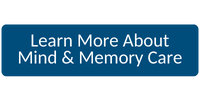What to Know About Alzheimer’s, Dementia, and Memory Care

Did you know that November is Alzheimer’s Awareness Month? Unfortunately, one in three seniors have Alzheimer’s disease or another form of dementia. We know, not exactly the news you wanted to hear. However, the more we learn about memory loss, the better equipped we are to fight it. Here’s a roundup of important facts and advice that can help you navigate potential changes in your memory or that of a loved one.
Early diagnosis is key. It could increase someone’s chance of benefiting from treatment, like being eligible for more clinical trials. That’s why at Benchmark, we really encourage everyone over 65 to get screened for Alzheimer’s and dementia by a doctor and to know the early warning signs of memory loss, like:
- Forgetting recently learned information and asking the same questions over and over.
- Difficulty working with numbers, like tracking monthly bills or following a familiar recipe.
- Having a hard time completing familiar tasks, like driving to a relative’s house or writing your grocery list.
- Vision issues, like an inability to gauge distances or distinguish colors (but remember, vision changes could also be related to cataracts).
- An inability to retrace your steps when you lose or misplace something.
- Regularly skipping or losing interest in your favorite social activities or hobbies like following sports teams.
- Close family and friends have noticed you haven’t been yourself, but you can’t really tell if something is wrong.
Noticing more ‘senior moments’ or memory lapses? Don’t stress –– that’s also a normal part of aging. The only way to really know what’s going on is for a doctor to do an evaluation and rule out other causes first.
If you or your loved one have been diagnosed with Alzheimer’s or another form of dementia, the right environment can make a huge difference, especially if either of you notice increased wandering or unintentional weight loss. The key is to find a Mind and Memory Care community or program with these three factors:
- A range of customizable, adaptive plans with different levels of support.
- A team of highly trained specialists who can evaluate you or your loved one on an ongoing basis in order to monitor any cognitive changes and make any care adjustments as needed.
- A mix of one-on-one and group activities and programs like music therapy, exercise classes, and off-site trips to help keep brains sharp.
The bottom line: when it comes to Alzheimer’s or dementia, know that you and your loved ones are not alone. In fact, at Benchmark, we pride ourselves on having 62 communities with expert-led Mind and Memory Care Neighborhoods, 11 of which are dedicated solely to Mind and Memory Care. If you or a loved one could benefit from our expertise, click below to learn more.



